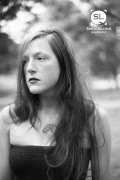I love the format of this story, and the story itself is much richer for it. It’s mildly confusing at first, then incredibly insightful. I keep finding myself rereading the two parts, in a sort of endless circle. Why did you choose this format?
First and foremost, this story—both the stand-alone piece and the larger flash novella from which it’s taken—is meant to add another voice to the collective narrative of living with serious mental illness. The footnote format played into that as a way to visualize one particular anxiety of social interaction, where every remark is played back and analyzed later to an agonizing degree. There’s no such thing as “I went on a date and it didn’t go well, but whatever.” Pairing that giant, very internally driven story with the blitheness of those few sentences it’s meant to footnote seemed like the best way to represent that.
To elaborate on my first question, was this how you planned it out, or did you have to tinker to make them influence each other so perfectly?
I always knew I wanted the simple story with the massive footnote, and later drafts of this story have toyed more with trying to find just the right two sentences for the top half. I’m a big fan of pairing disparate things to create discomfort.
I keep finding more in this story. Was it hard to say so much in so few words?
It’s funny you should say that. I’m a poet, and this is my first published piece of fiction (thanks, by the way!), so you could say that the real struggle has actually been that there are so many words. In writing fiction in general, I’ve struggled a lot with this idea that, yeah, you can say exactly what you mean without plopping a ghost tree or some weird birds in there and trusting your audience to follow the mood with you. I’m still learning the rules of fiction: what needs to be said on the page versus what weight should be carried in the silence. In the school of lyric poetry from which I’m traditionally writing, there’s this idea that meaning is subject to individual interpretation, that what you meant matters so much less than what a reader takes away. But in trying to create this narrative, and to do it in a way that neither trivializes nor overdramatizes a complex series of issues (negotiating mental illness and dating, dating after divorce, dating as a single parent, the politics of grief in creating bonds, plus reinforcing the idea that a life has no less meaning once a person has made the decision to end it), ambiguity feels a lot stickier. I agonize over saying too much or too little.
The lines in this story are gorgeous. A favorite is “and he laughs, and she laughs, though neither quite sound like joy so much as they sound like the breath before drowning.” The last part, “the breath before drowning,” is not just beautiful but holds so much meaning. Do you come across that beauty on first try, or does it take some revision to make those lines sing?
Don’t tell my professors, but I’m really bad at revision. There’s this magical place that young writers, especially poets, inhabit where they create this visceral, vulnerable content by cutting themselves open and spilling their guts all over the page, figuratively speaking. First drafts in that stage of writing hold so much weight because they represent this person’s heart made physical. They’re just as much about the experience of going to that place as they are about the piece itself. Then, over time, the hope is that a person can learn to write from a more peaceful, cerebral place, not only to develop that artistic distance, but to stop plumbing that place in order to avoid returning to the same emotional wells over and over again, or worse, burning out altogether. Engaging with artful language comes at that stage, and, hopefully, so does the drive to see writing as a process and to engage in thoughtful revision.
Unfortunately, I never graduated past that first stage. For me, writing is this embodied but ephemeral thing where I put everything on the line in the first draft and hope for the best. Knowing that there’s a drive to publish in order to be successful, I’ve had to learn how to get good at creating better first drafts, but that’s more a survival mechanism than anything else. I get very possessive of my first drafts—less defensiveness, more tunnel vision—and stories typically have to rest for a long time before I’m able to get the kind of distance required to do any serious revision. I have to approach my work as a stranger in order to talk myself out of the trap of “I hear what you’re saying, but I can’t see this piece existing any way but this one, so nice try.”
What are some of your influences in writing this story?
Jeanann Verlee’s “The Session” was one of the first pieces I read that embodied mental illness as a living creature that affected the speaker. I return to it often. Also (don’t laugh), NBC’s Hannibal remains my single greatest influence when it comes to dark and creepy things being beautiful and impossible to look away from. At the time I wrote this, I was also reading Jenny Offill’s Dept. of Speculation and Kathleen Founds’ When Mystical Creatures Attack!



 The core workshop of SmokeLong Fitness is all in writing, so you can take part from anywhere at anytime. We are excited about creating a supportive, consistent and structured environment for flash writers to work on their craft in a community. We are thrilled and proud to say that our workshop participants have won, placed, or been listed in every major flash competition. Community works.
The core workshop of SmokeLong Fitness is all in writing, so you can take part from anywhere at anytime. We are excited about creating a supportive, consistent and structured environment for flash writers to work on their craft in a community. We are thrilled and proud to say that our workshop participants have won, placed, or been listed in every major flash competition. Community works.